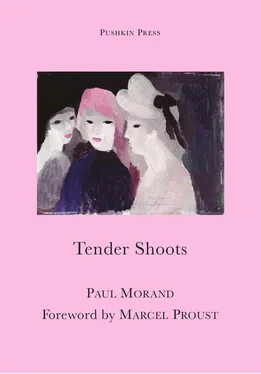Paul Morand - Tender Shoots
Здесь есть возможность читать онлайн «Paul Morand - Tender Shoots» весь текст электронной книги совершенно бесплатно (целиком полную версию без сокращений). В некоторых случаях можно слушать аудио, скачать через торрент в формате fb2 и присутствует краткое содержание. Год выпуска: 2011, Издательство: Pushkin Press, Жанр: Классическая проза, на английском языке. Описание произведения, (предисловие) а так же отзывы посетителей доступны на портале библиотеки ЛибКат.
- Название:Tender Shoots
- Автор:
- Издательство:Pushkin Press
- Жанр:
- Год:2011
- ISBN:нет данных
- Рейтинг книги:5 / 5. Голосов: 1
-
Избранное:Добавить в избранное
- Отзывы:
-
Ваша оценка:
- 100
- 1
- 2
- 3
- 4
- 5
Tender Shoots: краткое содержание, описание и аннотация
Предлагаем к чтению аннотацию, описание, краткое содержание или предисловие (зависит от того, что написал сам автор книги «Tender Shoots»). Если вы не нашли необходимую информацию о книге — напишите в комментариях, мы постараемся отыскать её.
Tender Shoots — читать онлайн бесплатно полную книгу (весь текст) целиком
Ниже представлен текст книги, разбитый по страницам. Система сохранения места последней прочитанной страницы, позволяет с удобством читать онлайн бесплатно книгу «Tender Shoots», без необходимости каждый раз заново искать на чём Вы остановились. Поставьте закладку, и сможете в любой момент перейти на страницу, на которой закончили чтение.
Интервал:
Закладка:
For the child in love with maps and prints
The Universe is equal to his huge appetite.
How vast is the world by lamplight!
How small is the world in memory’s eyes!
Worse still, when Baudelaire was prosecuted on account of Les Fleurs du mal , Sainte-Beuve refused to testify on his behalf, but wrote him a letter which he immediately asked to be returned to him once he realised that it was intended to make it public. When he published it later in his Causeries du lundi , he felt it was his duty to preface it with a short preamble (which would have the effect of making it feebler still) in which he stated that this letter was written “with the thought of coming to the aid of the defence”. The accolade was scarcely compromising, however. “The poet Baudelaire (it was said) had spent years extracting from every subject, and from every flower, an essence that was poisonous, and even, one has to say, pleasantly poisonous. He was furthermore a witty man, fairly likeable, and, at times, very capable of affection. When he published this collection entitled Les Fleurs du mal , he was not merely dealing with his critics, justice was involved too, as if there really was danger in these disguised pranks, and hidden meaning in the elegant rhyming” (which, incidentally, hardly tallies with “My poor child, how you must have suffered”). What is more, in this scheme for his own defence, Sainte-Beuve speaks well of an illustrious poet (“far be it from me to detract in any way from the fame of an illustrious poet, of a poet dear to us all, whom the Emperor has deemed worthy of a public funeral”). Unfortunately, this poet who is ultimately glorified is not Baudelaire, but Béranger. When Baudelaire, on the advice of Sainte-Beuve, withdraws his candidature for the Académie, the great critic congratulates him, and believes he has filled his cup with joy by telling him: “When they read your final sentence of thanks, written in such modest and courteous terms, they said aloud: ‘Very good’.” The most alarming thing is that not only does Sainte-Beuve think that he has behaved very well towards Baudelaire, but, alas, that in the appalling lack of encouragement, or simple justice, accorded Baudelaire, the poet shares the critic’s opinion and literally does not know how to express his gratitude to him.
However enthralling this story of a genius who underestimated himself may be, we must tear ourselves away and return to the matter of style. It certainly did not have the same importance for Stendhal as it did for Baudelaire. When Beyle described a landscape as “these enchanting spots”, “these beautiful places”, and wrote of one of his heroines as “this admirable woman”, he did not wish to be any more specific. He was so unspecific that he could allow himself to write: “She wrote him an interminable letter.” But if we consider that vast unconscious framework that encompasses the desired structure of ideas as being an aspect of style, then Stendhal has it. How much pleasure it would give me to show that each time Julien Sorel or Fabrice leave behind their vain cares to live a selfless and pleasure-seeking life, they always find themselves in some elevated place (be it Fabrice’s prison, or Julien’s, in the Abbé Banès’s observatory). This is as beautiful as those homage-bearing creatures, rather similar to latter-day Angels who, here and there, in Dostoevsky’s work, bow down low at the feet of the one they imagine they have slaughtered.
Thus, Beyle was a great writer without being conscious of the fact. He ranked literature not merely lower than life, when, on the contrary, it is the goal, but beneath its dreariest distractions. I confess that, were it sincere, nothing would shock me more than this passage from Stendhal: “Some people arrived and we did not part until very late. The nephew ordered an excellent zambajon from the Café Pedroti. In the country where I am going, I said to my friends, I am unlikely to find a household such as this, and to pass the long evening hours, I shall write a novel about our kind Duchess Sanseverina.” La Chartreuse de Parme , written for lack of a household where there is pleasant conversation and where they serve zambajon, there you have the complete antithesis of the poem or even the one-line alexandrine, towards which, according to Mallarmé, the various and fruitless activities of universal life all aim.
“Since the end of the eighteenth century no one has known how to write.” Would not the converse be just as true? In every art form, it would appear that talent is a bringing together of the artist and the object that is to be expressed. As long as the gulf remains, the job is not finished. A violinist may play his solo part very well, but you can see the effect; you applaud, he is a virtuoso. When all that has eventually vanished, when the violinist’s phrasing is of one being with the artist, then the miracle will have been accomplished. In other centuries, it seems as if there had always been a certain distance between the object and the lofty minds that deliberated about it. But with Flaubert, for instance, his intellect, which may not have been among the greatest, strives to become the vibration of a steamship, the colour of the foam, an island in the bay. There then comes a point when we no longer see this intellect (even Flaubert’s moderate intellect), and we have before us the boat that sails on “encountering trails of logs that began to toss about in the waves made by the wash”. This tossing about is intellect transformed, mind that has integrated with matter. It also manages to penetrate the moors, the beech trees, the silence and the light of the undergrowth. This transformation of energy, in which the thinker has disappeared and trails things before us, is this not the writer’s first attempt at style?
But M France does not agree. “What is your canon?” he asks us in this article that launches André Chaumeix’s new Revue de Paris with such a splash. And among those he puts forward, and compared to whom we write badly, he mentions Racine’s Lettres aux imaginaires. We reject the very principle of a ‘canon’, which would imply a uniform style independent of the many aspects of thinking. But if we actually had to choose one, and one which in M France’s terms might be considered “heavy artillery”, we would never choose the Lettres aux imaginaires . Nothing so dry, so impoverished, so slender. It is not difficult for a form that embodies so little thought to be light and graceful. Yet that of the Lettres aux imaginaires is neither: “I would even go so far as to say that you are not from Port Royal as one of you claims … How many people have read his letter who would not have looked at it had Port Royal not approved of it, had not these gentlemen distributed it …” etc. “You believe you are saying something extremely agreeable, for instance, when you say of a remark made by M Chamillard, that his capital O is merely the number 0 … it is quite clear that you are doing your utmost to be pleasant. But this is not the way to be so.” These repetitions would certainly not have interrupted the flow of a sentence by Saint-Simon, but where is the flow here, where the poetry, or even the style? These letters to the author of Les Imaginaires are almost as feeble as the absurd correspondence in which Racine and Boileau exchange their medical views. Very little that is medical. Boileau’s snobbishness (or rather what would nowadays be the excessive deference of a functionary towards officialdom) is such that he prefers the opinion of Louis XIV (who was wise enough not to give it) to consultations with doctors. He was convinced that a prince who had succeeded in capturing Luxembourg must be “inspired by Heaven” and could not utter more than “oracles” even in medicine. (I feel sure that in their entirely justified admiration for the Duc d’Orléans, my masters M Léon Daudet and M Charles Maurras, and their charming disciple Jacques Bainville, would not go so far as to ask him for medical advice from afar.) Furthermore, Boileau adds, who would not be happy to “lose his voice and even his tongue” on discovering that the King had asked for news of him?
Читать дальшеИнтервал:
Закладка:
Похожие книги на «Tender Shoots»
Представляем Вашему вниманию похожие книги на «Tender Shoots» списком для выбора. Мы отобрали схожую по названию и смыслу литературу в надежде предоставить читателям больше вариантов отыскать новые, интересные, ещё непрочитанные произведения.
Обсуждение, отзывы о книге «Tender Shoots» и просто собственные мнения читателей. Оставьте ваши комментарии, напишите, что Вы думаете о произведении, его смысле или главных героях. Укажите что конкретно понравилось, а что нет, и почему Вы так считаете.












